DCS Contracting: Paving Its Way to 30 Years (1994 - 2024)
Click here to see the full article in the 2024 Sept/Oct issue of AZ Contractor & Community.
When the late Douglas (Mack) Standifird set out to start his own construction company, he relied on his relationships, integrity, and a lot of hard work. These traits had served Mack well during his early career, when he started and ran other successful businesses. Seeking a new challenge, Mack surrounded himself with trusted partners and launched DCS Contracting, Inc. (DCS) in 1993. Officially incorporated on June 22, 1994, DCS has since become one of Arizona's leading locally owned heavy civil contracting firms.
"DCS began as a collective of friends and family who enjoyed collaborating," said Brandon Byrne, the current President and General Manager for DCS and the eldest son of one of the original partners, Marty Byrne. "They were eager to establish a company founded on mutual values, unwavering trust, and high-quality workmanship in heavy civil construction."
These friends and family created a company involved in many notable Phoenix projects and are poised to continue growing as the Valley expands across the Sonoran Desert. For 30 years, DCS has served as a trusted partner on projects large and small. To understand how DCS became one of Arizona's most respected heavy civil contractors, let's look back on their journey.
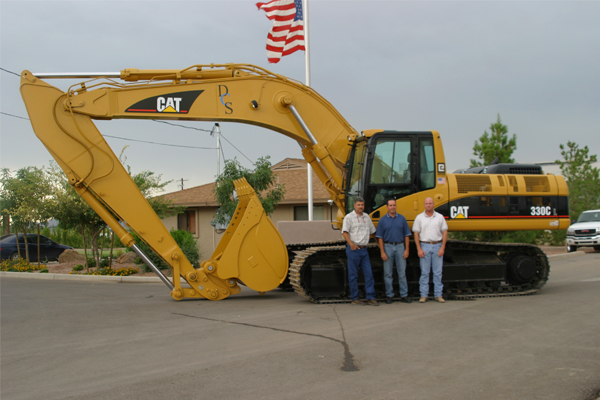
DCS founders Marty Byrne, Tom Sizer, and Wade Standifird (left to right) stand with their first purchase of a brand new excavator.
The Early Years
After starting DCS in November 1993 in Mesa, Mack brought on his son, Wade, as owner/operator and Tom Sizer as an accountant. Wade's first hire was Eleuterio Maldonado, affectionately known as Mr. T, as a laborer/grade checker. These hires proved successful, as both Sizer and Mr. T remained with DCS. Sizer served as Controller, and Mr. T took on the role of Field Operations Manager.
Shortly afterward, Mack's son-in-law Marty Byrne, a 10-year heavy civil construction veteran, joined the team to bid and manage projects. Mack, Marty, and Wade officially incorporated the company in June 1994, starting with only a few employees. Their focus was on small grading, paving, and underground utility projects. The initial equipment fleet included a 140G Motor Grader/ Blade, a 950E Loader, an End Dump, a CASE Backhoe, a Cat 613 Scraper, a Water Tower, a Water Truck, and a couple of pickup trucks. The first year was spent building relationships with general contractors and residential developers, completing small commercial and residential jobs. They ended 1994 with $1 million in revenue.
As DCS grew, maintaining company culture was crucial. Mack, Marty, and Wade had worked for large contractors before, where being an employee felt more like being a number than part of a team with common goals and ethics. This belief was continuously practiced, allowing DCS to retain its workforce and clients.
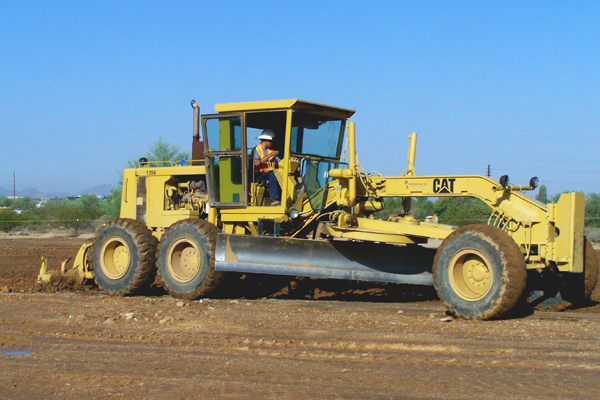
140G Blade prepping fill areas on a site at DC Ranch in the early days.
In 1998, a milestone year for DCS, Mack retired, and Tom Sizer became a part owner. That year also marked DCS's first major multi-year project: constructing the DC Ranch community in Scottsdale for DMB Associates. The DC Ranch site, located in the McDowell Mountains, posed many constructability challenges, providing a great sense of accomplishment upon completion. The scope of work included rock excavation, blasting, grading, paving, concrete, dry utilities, and water, sewer, and storm drain installation. DCS worked on DC Ranch projects for nearly 10 years until most of the community's land was developed.
"Before working at DC Ranch, we did small projects for residential developments, such as 10 to 20-lot subdivisions and 2- or 3-acre commercial sites," said Matthew Byrne, current Vice President and Chief Estimator at DCS and second eldest son of Marty Byrne. "Working at DC Ranch with DMB and Kitchell was a significant steppingstone to larger, single-family residential work, leading to consistent projects."
During a housing boom in the Valley, DCS's ongoing work at DC Ranch led to calls from several other developers and builders. In the first two years, DCS established itself as a trusted partner capable of self-performing multiple trades on a project and delivering high-quality results.
The rapidly growing company outgrew its initial office in Mesa and moved into a 1,500-square-foot office in Chandler in 1996, renting an equipment yard in Gilbert. The company purchased its first excavator, a Komatsu PC220 from Road Machinery & Supplies Co., that year. In 1997, two Case 590SL Loader Backhoes were acquired from Bingham Equipment Company.
DCS took another growth step by acquiring bonding to bid on public and private projects across the Valley in 1998. By the early 2000s, DCS made its largest equipment purchase to date with a Caterpillar 365B Excavator. This was followed by acquiring an 8-acre property in South Chandler from Chandler Ginning Co. The former cotton gin was transformed into the new DCS equipment yard, complete with a shop and storage facilities. DCS also renovated the old Scale House, built in 1955, into office space for its staff. This 2,000-square-foot office served DCS employees through 2018 and again in 2022 as the team continued to expand.
Marty's sons, Brandon and Matthew, joined DCS while attending Arizona State University and came on board full-time upon graduation. From a young age, both brothers learned the ins and outs of construction in the field. During their college years, they gained valuable experience in the trades and understood what it takes to be valued by clients and co-workers alike.

“It was a significant event whenever a piece of equipment was bought, whether new or used. I remember when a new machine was purchased; my father (Marty) would have it delivered to our house. My brothers and I would admire it as my dad put the DCS decals on it himself.”
– Matthew Byrne
Turning West
After a decade of successful work at DC Ranch, DMB approached DCS about constructing a new master-planned community in the West Valley called Verrado. The site characteristics at Verrado were similar to those of DC Ranch. DCS provided plan review, constructability review, and budgets for the development. Once the project began, DCS performed single-trade and community facilities district (CFD) improvements and turn-key lot development as a general contractor.
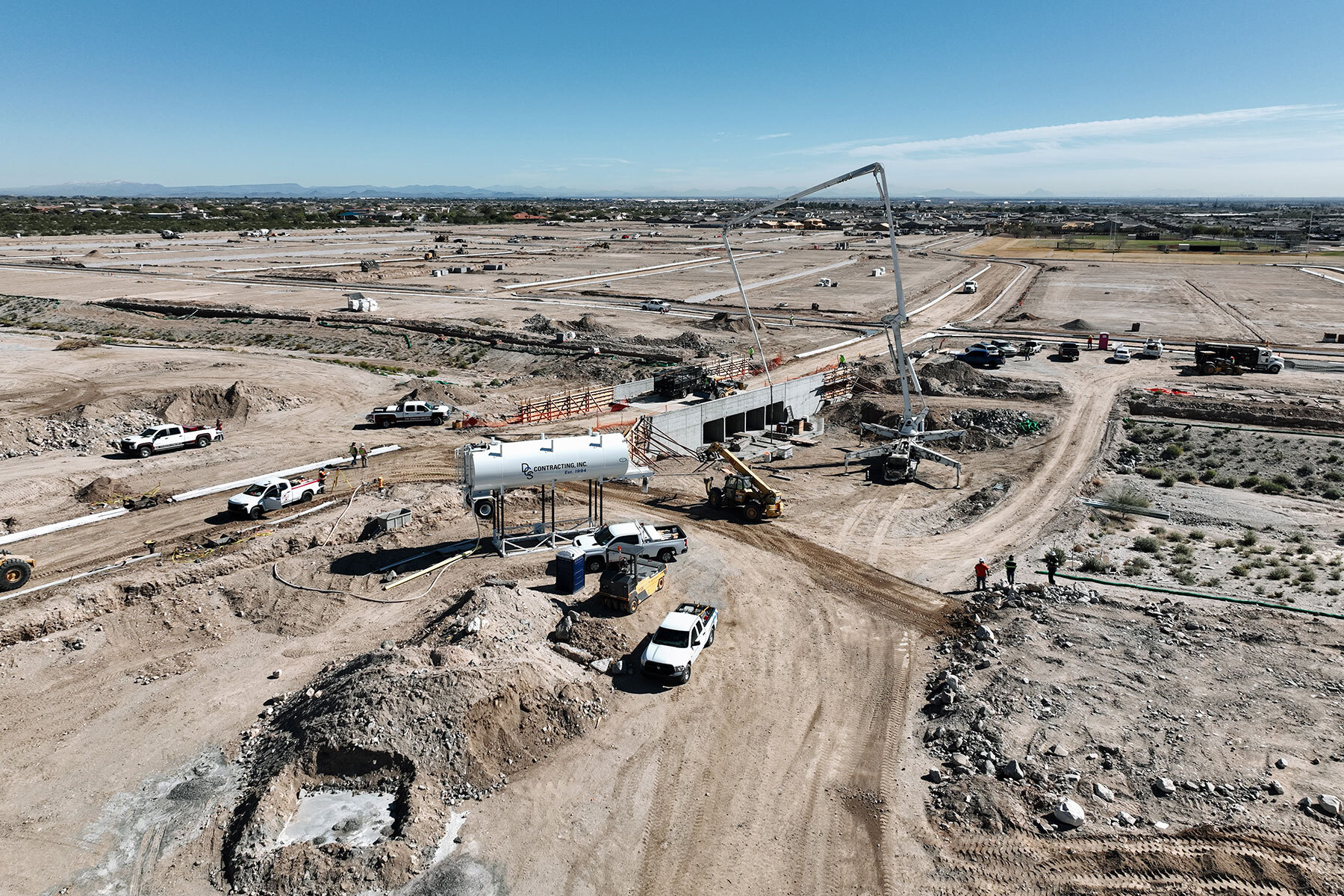
Since the 2000s, DCS has developed the Verrado master planned community in Buckeye.
In the mid-2000s, the Valley's housing market was booming, making it challenging to find subcontractors for certain trades—particularly concrete. So, in 2005, DCS began self-performing concrete work and purchased a Gomaco Commander III from Empire Machinery (known today as Empire Southwest).
As market share increased and building activity grew, the early 2000s' fever pitch gave way to the Great Recession of 2008- 2012. Like most firms in the construction market, DCS was hit hard. The firm experienced layoffs, and remaining employees took pay cuts to keep the company operational.
"We saw significant downsizing and restructuring during that time," said Brandon. "We shifted focus to public works and had significant success, completing projects for local municipalities."
In 2009, DCS was awarded a roadway and utility reconstruction project on Southern Avenue from 19th Avenue to 27th Avenue for the City of Phoenix. This project helped sustain the firm early in the recession. Following that project, DCS won the Higley and Frye Road Improvements, a roadway widening project for the Town of Gilbert. In late 2010, DCS undertook another project for the Town of Gilbert—a full road reconstruction of Queen Creek Road from Val Vista Drive to Higley Road.
"These projects were pivotal for DCS; they marked our entry into larger public works projects," said Brandon.
After The Storm
As the recession waned and single-family residential construction slowly rebounded, new clients— home builders, developers, and construction management firms—began recognizing DCS's value in analyzing sites that had foreclosed during construction. The DCS team inspected unfinished improvements for all scopes and used their expertise to develop project scopes and budgets to address deficiencies in existing improvements, enabling sites to be completed and homebuilding to continue.
With many developers and home builders having limited resources and expertise in land teams, DCS offered clients the option to rehabilitate existing sites as either a general contractor or subcontractor for a single trade. During this period, DCS also began focusing on commercial sites with challenging and extensive offsite improvements.
As the market recovered, DCS collaborated with ASU's Del E. Webb School of Construction to offer students valuable construction experience to support their career development. DCS recognized the importance of combining education with real-world experience and a strong work ethic. Many students excelled while working at DCS and transitioned to full-time employees, benefiting the company by engaging students early in their education.
Following in his father's footsteps, Wade's son Wes joined DCS in 2013. Similar to Brandon and Matthew, Wes worked in the field to gain the experience and knowledge required for a career in the industry.
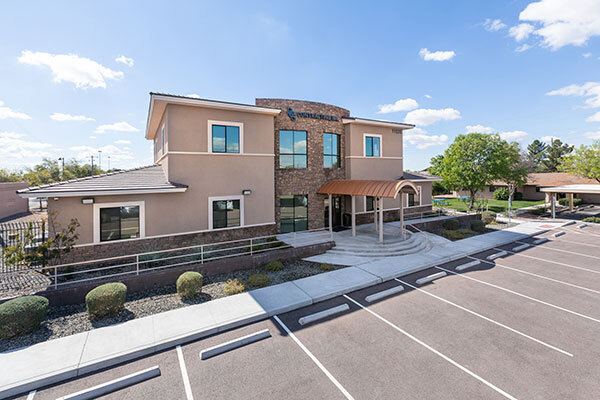
DCS office and equipment yard/shop located at 11535 E. Germann Road in Chandler.
DCS celebrated its 20th anniversary in 2014. In 2016, the company began finalizing plans to build a new two-story office building adjacent to its existing office and equipment yard. These plans, started before the recession, were put on hold due to anticipated shifts in the construction market.
Groundbreaking for the new office began in 2016, and by June 2017, the construction was over 80% complete. However, a fire destroyed the materials and work that had been done. After a year of insurance delays, DCS opened the new office building at 11535 E. Germann Road in June 2018.
Eye On The Future
In recent years, DCS has achieved its goal of expanding its client base in both public and private markets, utilizing negotiated, low/hard bid, Construction Manager at Risk (CMAR), and job order contracting (JOC) delivery methods.
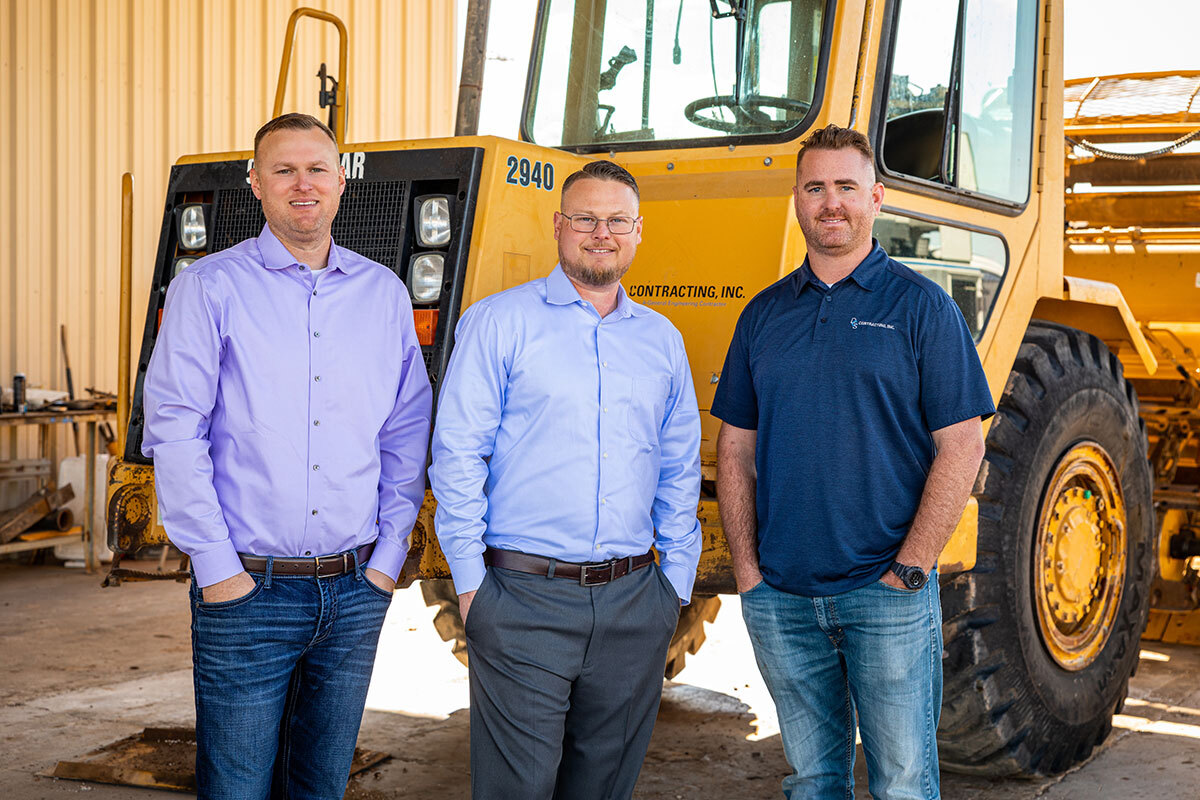
DCS’s legacy: Matthew Byrne, Brandon Byrne, and Wes Standifird.
"As DCS looks to the future, we recognize that many talented individuals are retiring from the industry," said Brandon. "It's crucial that our team members receive training and mentoring to grow with us and the industry. This will be a key step for DCS in continuing to grow while maintaining our culture."
Now with 225 team members and over 150 pieces of owned equipment, DCS continues to provide integrated heavy civil construction services while staying true to its core values of teamwork, integrity, and safety.